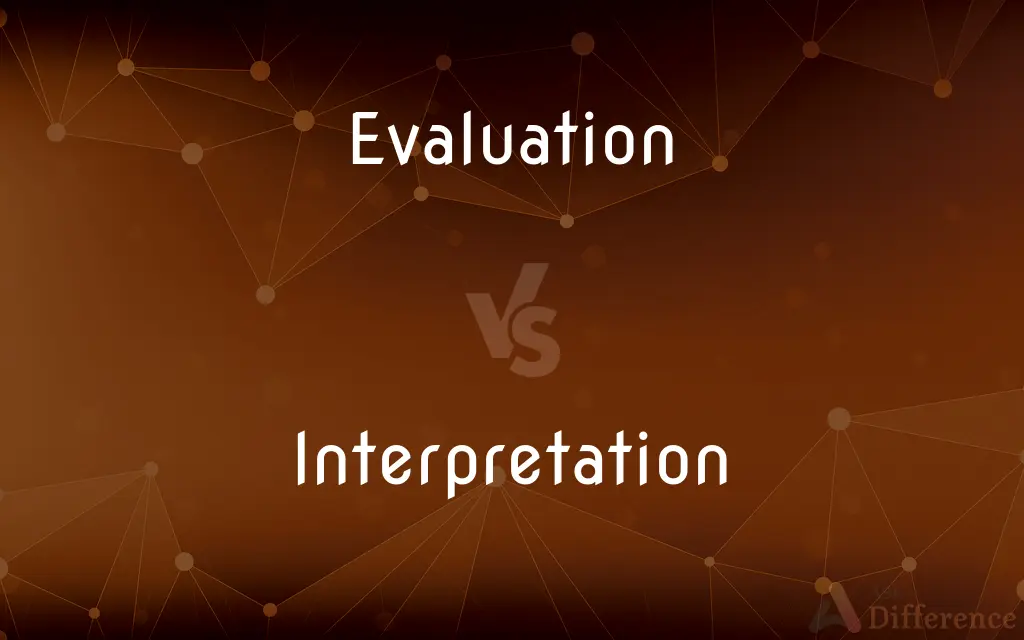Evaluation vs. Interpretation — What's the Difference?
Edited by Tayyaba Rehman — By Maham Liaqat — Updated on April 4, 2024
Evaluation focuses on assessing the value or performance, while interpretation seeks to explain meaning and significance.

Difference Between Evaluation and Interpretation
Table of Contents
ADVERTISEMENT
Key Differences
Evaluation and interpretation are fundamental processes used across various fields, but they serve distinctly different purposes. Evaluation involves the process of assessing or judging the value, quality, or performance of something, often based on specific criteria. This process is crucial in educational settings, where teachers evaluate students' work, or in project management, where outcomes are evaluated against objectives. On the other hand, interpretation deals with the act of explaining or understanding the meaning and significance of something. It plays a key role in fields such as literature, where texts are interpreted to uncover deeper meanings, and in data analysis, where results are interpreted to derive insights.
While evaluation is concerned with determining the effectiveness or worth of something, interpretation focuses on understanding the underlying meanings and implications. For example, in an art critique, the evaluation might assess the technical skill and aesthetic appeal of a piece based on art principles, whereas the interpretation would seek to understand the artist's message or the emotional impact of the artwork. This distinction highlights how evaluation is more about judgment based on criteria, whereas interpretation is about meaning-making and uncovering layers of significance.
Evaluation often requires the application of established criteria or benchmarks. In the context of education, for instance, teachers use rubrics to evaluate students' assignments, measuring them against predefined standards of excellence. Conversely, interpretation relies more on subjective analysis and personal perspective, especially in fields like art and literature, where different people might interpret the same work in various ways based on their backgrounds, experiences, and personal views.
The outcomes of evaluation and interpretation can lead to different types of actions. Evaluation results might lead to decisions such as passing a student, improving a product's design, or changing a project's direction based on its performance. In contrast, the insights gained from interpretation might guide further exploration of a topic, influence the approach to teaching a concept, or enrich the understanding of a work of art.
Both processes, while distinct, can be complementary. For example, in research, the interpretation of data provides insights and understandings that are crucial for evaluating the implications of the findings and their relevance to theoretical frameworks or practical applications. This interplay between evaluation and interpretation underscores their integral roles in the process of inquiry and analysis across disciplines.
ADVERTISEMENT
Comparison Chart
Purpose
To assess value or performance
To explain meaning and significance
Criteria
Often uses specific criteria or benchmarks
Relies on subjective analysis and perspective
Fields of Application
Education, project management, product development
Literature, art, data analysis
Outcome
Decision making based on assessment
Enhanced understanding or insight
Nature
Objective and based on predefined standards
Subjective and open to multiple perspectives
Compare with Definitions
Evaluation
Assessment of Performance.
The teacher's evaluation of the students' projects was based on creativity and technical skills.
Interpretation
Understanding Significance.
The data interpretation highlighted trends that were not immediately obvious.
Evaluation
Measure of Effectiveness.
The project's evaluation revealed its impact on community health.
Interpretation
Personal Perspective.
Her interpretation of the film was influenced by her own experiences.
Evaluation
Determination of Value.
The evaluation of the artwork considered its historical significance and market value.
Interpretation
Subjective Analysis.
Interpretation of abstract art varies greatly among viewers.
Evaluation
Objective Analysis.
The evaluation report provided a comprehensive overview of the program's outcomes.
Interpretation
Uncovering Layers.
Through interpretation, the historian uncovered the document's deeper historical context.
Evaluation
Judgment Based on Criteria.
Her evaluation of the new software focused on usability and functionality.
Interpretation
Explanation of Meaning.
His interpretation of the poem uncovered themes of loss and hope.
Evaluation
Evaluation is a systematic determination of a subject's merit, worth and significance, using criteria governed by a set of standards. It can assist an organization, program, design, project or any other intervention or initiative to assess any aim, realisable concept/proposal, or any alternative, to help in decision-making; or to ascertain the degree of achievement or value in regard to the aim and objectives and results of any such action that has been completed.
Interpretation
(countable) A sense given by an interpreter; an exposition or explanation given; meaning.
Commentators give various interpretations of the same passage of Scripture.
Evaluation
The making of a judgement about the amount, number, or value of something; assessment
An initial evaluation of the programme
The evaluation of each method
Interpretation
The act or process of interpreting.
Evaluation
To ascertain or fix the value or amount of
Evaluate the damage from the flood.
Interpretation
A result of interpreting.
Evaluation
To determine the importance, effectiveness, or worth of; assess
Evaluate teacher performance.
Interpretation
An explanation or conceptualization by a critic of a work of literature, painting, music, or other art form; an exegesis.
Evaluation
(Mathematics) To calculate the numerical value of; express numerically.
Interpretation
A performer's distinctive personal version of a song, dance, piece of music, or role; a rendering.
Evaluation
An assessment, such as an annual personnel performance review used as the basis for a salary increase or bonus, or a summary of a particular situation.
The result of the semestral evaluation will go towards your final score.
Interpretation
(countable) An act of interpreting or explaining something unclear; a translation; a version.
The interpretation of a dream, or of an enigma
The interpretation of the rules
Evaluation
(mathematics) A completion of a mathematical operation; a valuation.
Interpretation
The discipline or study of translating one spoken or signed language into another (as opposed to translation, which concerns itself with written language).
Evaluation
Determination of the value of a variable or expression.
Interpretation
(uncountable) The power of explaining.
Evaluation
Valuation; appraisement.
Interpretation
(countable) An artist's way of expressing his thought or embodying his conception of nature.
Evaluation
Act of ascertaining or fixing the value or worth of
Interpretation
(countable) An act or process of applying general principles or formulae to the explanation of the results obtained in special cases.
Evaluation
An appraisal of the value of something;
He set a high valuation on friendship
Interpretation
An approximation that allows aspects of a mathematical theory to be discussed in ordinary language.
Interpretation
An assignment of a truth value to each propositional symbol of a propositional calculus.
Interpretation
Heritage interpretation
Interpretation
The act of interpreting; explanation of what is obscure; translation; version; construction; as, the interpretation of a foreign language, of a dream, or of an enigma.
Look how we can, or sad or merrily,Interpretation will misquote our looks.
Interpretation
The sense given by an interpreter; exposition or explanation given; meaning; as, commentators give various interpretations of the same passage of Scripture.
Interpretation
The power or explaining.
Interpretation
An artist's way of expressing his thought or embodying his conception of nature.
Interpretation
The act or process of applying general principles or formulæ to the explanation of the results obtained in special cases.
Interpretation
A mental representation of the meaning or significance of something
Interpretation
The act of interpreting something as expressed in an artistic performance;
Her rendition of Milton's verse was extraordinarily moving
Interpretation
An explanation that results from interpreting something;
The report included his interpretation of the forensic evidence
Interpretation
An explanation of something that is not immediately obvious;
The edict was subject to many interpretations
He annoyed us with his interpreting of parables
Often imitations are extended to provide a more accurate rendition of the child's intended meaning
Common Curiosities
What is the main purpose of evaluation?
To assess the value, quality, or performance of something based on specific criteria.
Can evaluation and interpretation be used together?
Yes, they are often complementary, especially in research and analysis.
Is interpretation always subjective?
While interpretation involves personal perspective, it can be informed by knowledge and context.
What fields commonly use evaluation?
Education, project management, and product development are a few examples.
How is interpretation applied in literature?
It involves analyzing texts to uncover deeper meanings and themes.
What outcomes result from evaluation?
Decisions related to improvement, development, or understanding of value.
Why is interpretation important in art?
It allows for the exploration of diverse meanings and emotional impacts.
How does interpretation differ from evaluation?
Interpretation focuses on explaining the meaning and significance, rather than judging quality or performance.
Can different people interpret the same thing differently?
Yes, interpretations can vary based on individual perspectives and backgrounds.
What role does criteria play in evaluation?
Criteria are essential for objective assessment and comparison.
How do criteria for evaluation vary?
Criteria can be tailored to specific fields, objectives, or standards of excellence.
Can the value of something change based on evaluation?
Yes, as new information or assessments come to light, the perceived value can increase or decrease.
What is an example of a field where both evaluation and interpretation are crucial?
In educational research, where data is interpreted for insights and evaluated for implications.
Is there a universal approach to interpretation?
No, interpretation is influenced by cultural, historical, and personal factors, making it diverse and multifaceted.
What makes a good interpretation?
A good interpretation is informed, thoughtful, and opens up new understandings or perspectives.
Share Your Discovery

Previous Comparison
Onward vs. Upward
Next Comparison
Caterpillar vs. ButterflyAuthor Spotlight
Written by
Maham LiaqatEdited by
Tayyaba RehmanTayyaba Rehman is a distinguished writer, currently serving as a primary contributor to askdifference.com. As a researcher in semantics and etymology, Tayyaba's passion for the complexity of languages and their distinctions has found a perfect home on the platform. Tayyaba delves into the intricacies of language, distinguishing between commonly confused words and phrases, thereby providing clarity for readers worldwide.
















































